Unabated load-shedding drives JI onto the streets of Karachi
Hafiz Naeemur Rehman blames MQM for protests’ lack of success
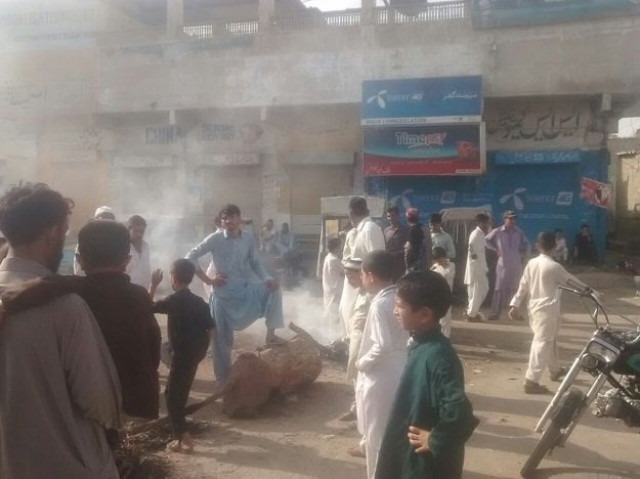
JI workers protest in Karachi. PHOTO: EXPRESS
Early in the day, JI supporters blocked roads in Malir 15, Kala Board, Shah Faisal number 2, Orangi Town, Dehli Colony and Lyari, resulting in severe traffic jams. In Malir 15, commuters travelling to offices and schools faced difficulties in the morning.
Some private schools in Lyari remained closed due to the strike. A contingent of police and Rangers were later deployed on Sharae Faisal to ensure the smooth flow of traffic. JI’s Karachi amir, Hafiz Naeemur Rehman, announced that they will continue to stage protests in the city until the crisis is resolved.
Protests were also held in Banaras, Mominabad, Nazimabad, Landhi, on University Road and a few areas of Korangi. Petrol pumps and markets were partially closed in different areas of the city.
SSGC, K-Electric trade blows but consumers get hurt
The protesters burnt tyres and chanted slogans against K-Electric (K-E) and the Karachi Water and Sewerage Board (KWSB). They held placards inscribed with ‘Give Karachi water, give Karachi electricity’ aloft. Scores of residents also made their way onto the streets to join hands with the politico-religious party.
There are up to seven hours of announced load-shedding in addition to several hours of unannounced load-shedding in different parts of the city. The water problem has arisen as a result of the power cuts, as KWSB is mainly dependent on K-E for continuation of water supply.
The worst affected areas are Lyari, Saddar, Bizerta Lines, Kala Pul, Malir, Shah Faisal, Landhi, North Karachi, Nazimabad, North Nazimabad, Gulistan-e-Jauhar and Gulshan-e-Iqbal. Students appearing for intermediate exams are also facing problems due to the power cuts.
After 12pm, Rehman announced that the strike had been called off, after which the roads leading from Malir and Kala Board to the airport were opened for traffic with party members moving towards Drigh Road for a sit-in.
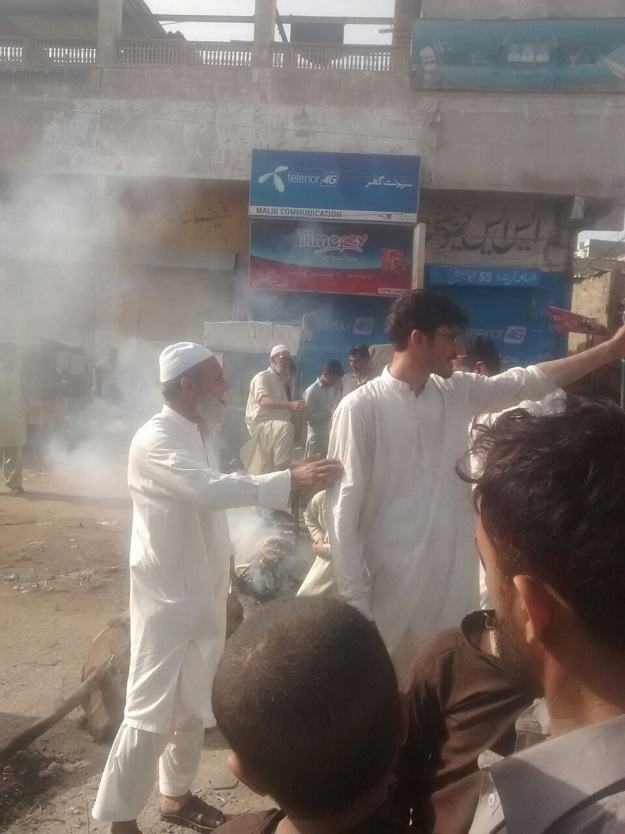 JI workers protest in Karachi. PHOTO: EXPRESS
JI workers protest in Karachi. PHOTO: EXPRESSAt a press conference at JI’s headquarters, Idara Noor-e-Haq, the party’s Karachi head told the media that another round of protests will begin in Saddar, Empress Market and Regal Chowk along with Boulton Market and Lea Market later in the day. The purpose of the strikes was to record protest against those who are depriving the port city of power and water.
He blamed the Muttahida Qaumi Movement (MQM) for impeding the success of the strike in Karachi. Rehman alleged that unidentified men harassed shopkeepers to open up their shops while the protest was being carried out in different parts the city. He also accused the police of assaulting and arresting JI workers who were trying to make the strike effective. “The efforts of our members are reasonable, we are going to expand the scope of our protest,” he said.
Rehman announced that the party will stage protests outside the KWSB office on Sharae Faisal, which would be even bigger than their strike.
He requested traders to open their shops and businesses after Friday prayers. “The city used to witness unnecessary strikes in the past. The MQM would shut down the city on the orders of their leader in London,” he said. “Ours is a peaceful strike and conforms to the laws. Unlike the past, our strike highlighted genuine public issues.”
CM accuses federal govt of intentionally causing load-shedding in Sindh
The JI leader went on to say that they have been urging the courts to take action. “Electricity and water at cheaper rates are the public’s right,” he said, adding that Prime Minster Shahid Khaqan Abbas was obliging K-E rather than the residents of Karachi.
After cutting the quota of gas to CNG stations, it is being supplied to the K-E, he said. Over one million people are deprived of power and water in this city, Rehman claimed. The entire system of the KWSB, he said, has been destroyed due to political appointments.
About a dozen workers of JI were apprehended during the protest.
JI Information Secretary Zahid Askari claimed that the police picked up at least seven to eight of their protesting workers from Malir, Shah Faisal and Gulshan-e-Maymar, however, he said that the detainees would likely be released soon.
Zone East police chief DIG Zulfiqar Larik said that the overall protests were peaceful while the heavy deployment of police had been done in order to avoid any untoward incidents. Police sources said that the protesters were detained from Gulshan-e-Maymar on a private complaint after some protesters turned violent and tried to damage a shop.
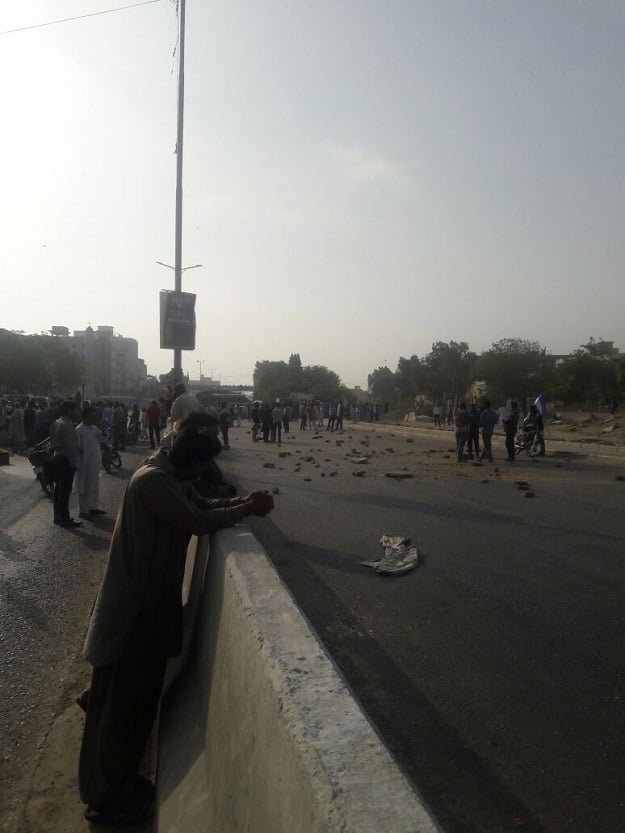 Protests over load-shedding in Karachi. PHOTO: EXPRESS
Protests over load-shedding in Karachi. PHOTO: EXPRESSHistory
Last Friday JI also staged a protest against the power utility outside the Karachi Press Club (KPC), while the Pak Sarzameen Party (PSP) arranged a sit-in outside the K-E head office near Sunset Boulevard.
JI had earlier announced to stage a protest outside Chief Minister House, however, it changed the venue to the KPC after CM Murad Ali Shah met the party’s leadership the day before and requested them to change the venue, assuring them that the provincial government would take steps to resolve the issue.
After their protests, on April 23, Prime Minister Abbasi visited Karachi and instructed K-E and the Sui Southern Gas Company (SSGC) to resolve the issue within 15 days and restore the supply of electricity to residents. He had also instructed the authorities to ensure the required supply of gas to K-E.
After the directive, the SSGC increased gas supply to K-E. Karachi has been facing severe load-shedding after K-E said SSGC had curbed its gas supply and it was thus unable to produce the required amount of power. The gas company, on the other hand, had claimed K-E owes it millions of rupees in unpaid dues.
Protests against load-shedding continue
In all of this, it was the residents of Karachi who bore the brunt of the tug-of-war, as prolonged power cuts continued to plague the city. In mid-April, National Electric Power Regulatory Authority (Nepra) officials visited Karachi to investigate the power crisis and issued a report in which they highlighted that the power utility is not operating its alternative fuel plants with which they could produce 300 megawatts of electricity.
Meanwhile, K-E said in a statement that normal power supply across the city has resumed with the required gas being provided by SSGC. “More than 61% of Karachi is currently exempted from load-shedding and this includes industrial zones, whereas, supply of electricity is normal at intermediate examination centres,” read the statement.


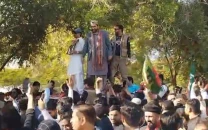
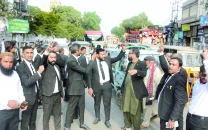















COMMENTS
Comments are moderated and generally will be posted if they are on-topic and not abusive.
For more information, please see our Comments FAQ